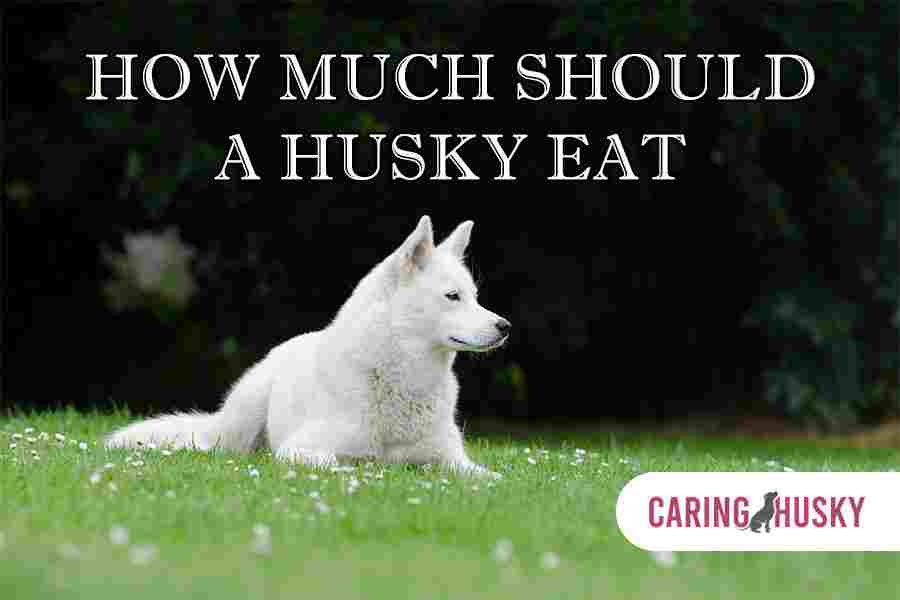The Siberian Husky, known for its stunning appearance and vibrant energy, is a breed that captivates the hearts of dog lovers worldwide. However, maintaining the health and happiness of these spirited canines hinges significantly on their diet. A well-balanced diet fuels their active lifestyle and ensures their overall well-being. In this article, we delve into the intricacies of a Husky’s dietary needs, exploring factors such as age, activity level, and health to determine the optimal feeding routine. Understanding the importance of nutrition in a Husky’s life is crucial for any responsible owner, and our guide aims to provide comprehensive insights into how much a Husky should eat to thrive.
How Much Should a Husky Eat?
The amount a Husky should eat varies based on age, size, and activity level. Generally, adult Huskies require about 2 cups of high-quality dry food per day, divided into two meals. However, active Huskies might need more to meet their energy demands, while less active or older Huskies might need less to prevent weight gain. Puppies, growing rapidly, often require more frequent feedings of specially formulated puppy food. Always ensure clean water is available and adjust portions based on your Husky’s health and lifestyle, consulting a vet for personalized advice.
The Nutritional Requirements For A Husky
Huskies, renowned for their endurance and vitality, have distinct nutritional needs that are crucial for their health and well-being:
Proteins: As active dogs, Huskies require a diet of proteins essential for muscle development and repair. High-quality sources like lean meats (chicken, beef, fish), eggs, and legumes should be staples in their diet.
Fats: Fats are vital for energy, especially for Huskies, often involved in strenuous activities. Sources like fish oil, flaxseed, and chicken fat provide energy and support a healthy coat and skin.
Carbohydrates: While Huskies don’t require a high carbohydrate diet, good sources like whole grains, vegetables, and some fruits are important for providing dietary fiber, aiding digestion, and supplying essential vitamins and minerals.
Vitamins and Minerals: A balanced intake of vitamins and minerals is crucial. This includes calcium and phosphorus for bone health and a range of vitamins (A, B, C, D, E, K) for overall bodily functions. Commercial foods are usually formulated to meet these needs, but supplements might be necessary in the case of homemade diets.
Omega Fatty Acids: Omega-3 and Omega-6 fatty acids are important for cognitive function, joint health, and maintaining a lustrous coat. These can be found in fish oils and certain plant oils.
Feeding Guidelines For Huskies
Feeding Huskies appropriately requires understanding their unique dietary needs and adapting to their life stage and activity level:
- Puppy Feeding: Up to the age of 12 months, Husky puppies need nutrient-rich puppy food given in 3-4 small meals per day. This supports their rapid growth and development. Portion sizes should be carefully controlled to prevent overfeeding.
- Adult Husky Feeding: Once Huskies reach adulthood, they typically require two daily meals. An average adult Husky might need about 2 cups of high-quality dry dog food daily, but this can vary based on activity level. Highly active Huskies may need more to sustain their energy.
- Senior Husky Diet: As Huskies age, their metabolism slows down. Senior Huskies, usually over 7 years old, often require fewer calories and might benefit from a diet formulated for senior dogs, which is lower in calories but still nutritionally balanced.
- Measuring Food Portions: Consistently measure food portions to avoid overfeeding or underfeeding. Adjusting portion sizes according to the dog’s weight, age, and activity level is crucial.
- Type of Food: High-quality commercial dog food that meets AAFCO guidelines is generally recommended. Some owners choose a raw or homemade diet, but this should only be done under veterinary guidance to ensure nutritional balance.
- Special Dietary Needs: Be mindful of any special dietary needs your Husky may have, such as food sensitivities or allergies, and choose a diet that accommodates these requirements.
- Regular Weight Checks: Regularly monitor your Husky’s weight and body condition, adjusting their diet to maintain a healthy weight. Overweight Huskies are prone to health issues, just as underweight dogs are.
- Fresh Water: Always provide access to fresh water, as hydration is essential for overall health, especially for a breed with a thick coat like the Husky.
Types Of Different Dog Food
Selecting the correct type of food is crucial for a dog’s health and well-being. There are several options available, each with its benefits:
Dry Kibble:
This is the most common type of dog food due to its convenience and long shelf life. High-quality kibble can provide complete nutrition and has various formulas to suit different breeds, ages, and dietary needs. It’s also beneficial for dental health, helping to reduce plaque and tartar buildup.
Wet Food:
Wet or canned dog food is often more palatable and may be preferable for dogs with dental issues or picky eaters. It has a higher moisture content, which can benefit hydration, but generally has a shorter shelf life once opened.
Raw Food Diet (BARF – Bones and Raw Food or Biologically Appropriate Raw Food):
This diet includes raw meat, bones, fruits, and vegetables. Proponents argue it’s more natural and similar to what dogs eat in the wild. However, it requires careful balance to meet nutritional needs and has risks like potential bacterial contamination and choking hazards.
Homemade Dog Food:
Preparing dog food at home allows for complete control over the ingredients. This can be advantageous for dogs with specific health issues or allergies. However, consulting with a veterinarian or a canine nutritionist is essential to ensure the diet is balanced and meets all nutritional requirements.
Freeze-Dried and Dehydrated Food:
These are convenient alternatives to raw diets, offering a longer shelf life while retaining most of the nutrients found in raw ingredients. They require rehydration before feeding and can be used as a complete meal or a supplement to other types of food.
Specialized Diets:
These include prescription diets for specific health issues like kidney disease, diabetes, or allergies. They are usually formulated based on veterinary research and should be used under veterinary guidance.
Grain-Free and Limited Ingredient Diets:
Aimed at dogs with allergies or sensitivities, these diets exclude common allergens and are simpler to make identifying and avoiding triggers easier.
How To Monitor Your Husky’s Diet?
Monitoring your Husky’s diet is vital to ensure they remain healthy and energetic. Here’s a detailed approach on how to effectively monitor a Husky’s diet:
Regularly weighing your Husky is one of the simplest ways to monitor their diet. Sudden weight gain or loss can indicate dietary imbalances or health issues. Keeping a weight log can help track changes over time.
In addition to weight, assessing your Husky’s body condition is crucial. You should be able to feel (but not see) their ribs without much fat covering. They should have a visible waist when viewed from above and a tucked-up abdomen when viewed from the side.
Keep track of how much food your Husky consumes daily. If they’re consistently leaving food behind, it could be a sign that you’re overfeeding or that they don’t like their food. Conversely, they might not get enough if they seem overly eager to lose weight.
Changes in your Husky’s bowel movements can indicate dietary issues. Diarrhea, constipation, or changes in stool color or consistency should prompt a review of their diet.
A Husky’s diet directly impacts their coat and skin health. A shiny, thick coat and healthy skin are signs of good nutrition. Dull coats, excessive shedding, or skin irritations suggest necessary dietary adjustments.
Regular check-ups with a veterinarian are essential for monitoring your Husky’s health. Vets can provide advice on dietary needs and identify any underlying health issues that may affect your Husky’s dietary requirements.
A Husky’s dietary needs will change as they age. Puppies, adults, and senior Huskies have different nutritional requirements. Be prepared to adjust their diet as they transition through these life stages.
Huskies are typically active dogs, but their dietary needs will differ if your dog is more or less active than average. Active dogs require more calories, while inactive dogs may need fewer to avoid weight gain.
FAQ’s
Do Huskies require a lot of food?
Huskies, contrary to their size and energy levels, do not require excessive food. They have efficient metabolisms designed for endurance rather than speed, so they often need less food than other breeds of similar size. The key is to provide high-quality, nutrient-dense food in appropriate portions tailored to their age, health, and activity level.
What is the best food for a husky?
The best food for a Husky is high-quality, balanced dog food rich in proteins and fats with moderate carbohydrates. Look for foods with whole meat sources, healthy fats like fish oil, and minimal fillers. The choice between dry kibble, wet food, or a raw diet depends on the Husky’s health, age, and dietary preferences, and it’s always advisable to consult a veterinarian for personalized recommendations.
Do Huskies eat rice?
Yes, Huskies can eat rice. It’s a good source of carbohydrates and can be a part of a balanced diet. Rice is often used in commercial dog foods and benefits dogs with sensitive stomachs. However, it should be served cooked and plain, without any added spices or ingredients.
Conclusion
When feeding Huskies, focusing on a balanced diet tailored to their needs is important. While they can eat various foods, including rice, the emphasis should be on high-quality protein sources, healthy fats, and moderated carbohydrates. Regular monitoring of their diet, along with veterinary guidance, ensures they maintain optimal health and energy levels. Remember, each Husky is unique, and their diet should reflect their specific lifestyle and health requirements.





Leave a Reply